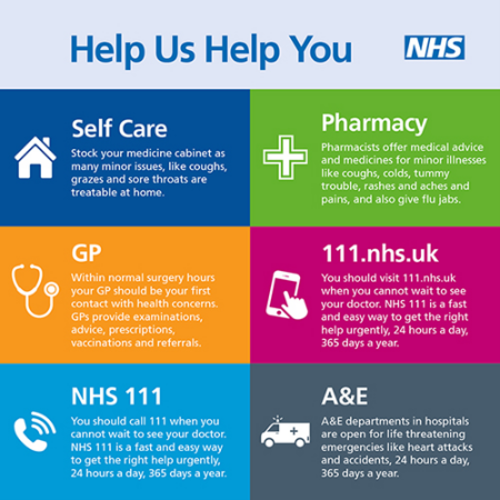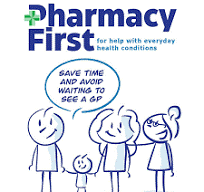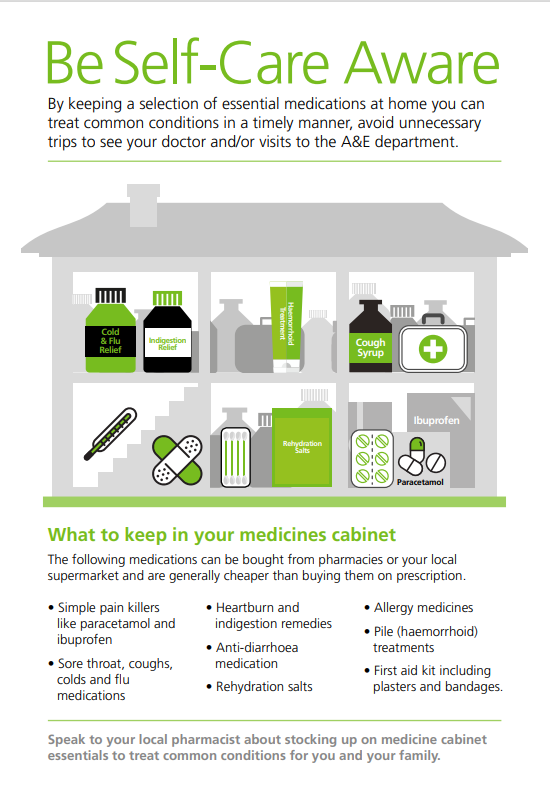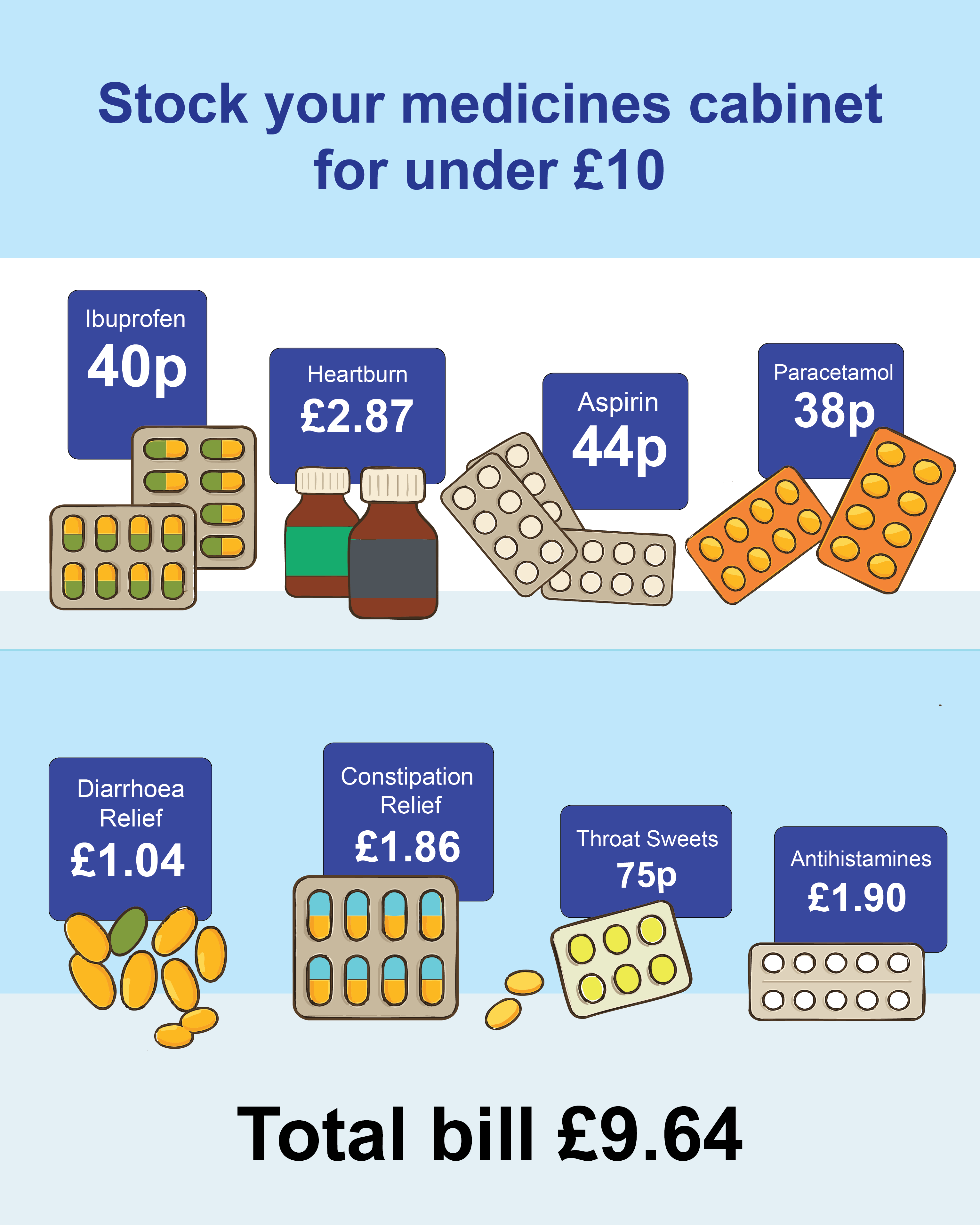Changes to how the NHS prescribes over the counter medicines for minor health conditions
In March 2018, NHS England published guidance about reducing the prescribing of medicines or treatments that are available to buy ‘over the counter’.
This means that certain medicines may no longer be prescribed if you can buy them ‘over the counter’.
Over the counter medicines (OTC) are non-prescription medicines that can be purchased in pharmacies, supermarkets and many local shops.
Self-care using over the counter medicines helps you to look after yourself and your family when you can.
If you have an OTC medicine on your prescription that is suitable to purchase, your GP will ask you to buy it, if it is appropriate to do so. This is In line with NHS England recommendations.
NHS England recommendations came into place in 2017 regarding prescriptions which can be purchased over the counter from a pharmacy or other outlets. Since then, the NHS has reduced its annual spend from £569 million per year to £248 million per year on these products, enabling reinvestment in other essential services.
No. It is important to note that the guidance focuses on restricting prescribing for the minor, short term conditions or self-limiting conditions outlined, not on the restriction of prescribing or individual items.
If you are taking medicines prescribed by your GP and you are worried about taking an OTC treatment, a pharmacist will be able to advise you on drug interactions.
A local community pharmacist can discuss with you what prescribed medicines you take and advise you if they are suitable with OTC medicines.
Many community pharmacies have a private room for consultations which you can request to use if you want to talk to the pharmacist in private. You don’t need to make an appointment to see your pharmacist, but at busy times the counter assistant may ask you to wait for a few minutes until they are available.
Most people have access to a community pharmacy within a short distance of their home, you can find your nearest one here. However, if you struggle to get to yours, then talk to your pharmacist to see if they can help to find a solution. Many community pharmacies are open at weekends or late into the evening.
It is also beneficial to keep a small supply of some OTC medicines at home so that you have them to hand when you feel unwell and means you don’t have to leave the house.
There are restrictions on the quantity of some OTC medicines that you can buy at any one time, but these should be enough to manage a minor illness. Larger quantities can be sold by a pharmacy and your pharmacist can advise you on what the limits are.
If you require regular, long-term treatment with a medicine then this will be prescribed for you if your GP thinks you need it, even if it can be purchased OTC. However, unless you require a medicine on a regular basis you will be expected to purchase OTC preparations for minor illnesses like everyone else.
If you have a pre-payment certificate you will also be asked to purchase your OTC treatments for minor ailments. However, if you need regular treatment for a long-term condition, then this will be supplied on prescription covered by your pre-paid certificate.
Age is not an exception to the guidance. However, you may meet one of the exception criteria in the guidance. See Lincolnshire Guidance for more details.
Exemption from prescription charges is not an exception to the guidance. However, you may meet one of the exemption criteria in the guidance. See Lincolnshire Guidance for more details.
If you are admitted to hospital you will be given an adequate supply of medicines when you are discharged, which will be free of charge. This may also include medicines for minor ailments if you have been prescribed these during your stay and it is thought that a further supply will help your recovery when you go home. However, if they are not required on a regular long-term basis, then they will not be added to your repeat prescription and you will be asked to purchase them in the future.
Yes, all local NHS services should be supporting the guidance. If you require advice for one of the minor conditions listed, then visit your local pharmacy first. Please do not attend out of hours or A&E services to get over the counter medicines.
If you have a general enquiry about the changes to over the counter medicine prescribing or wish to make a complaint about these changes, please contact the ICB rather than your general practice. You can:
• Email: LICB.feedbacklincolnshireicb@nhs.net
• Telephone: 01522 309299
• Write: Lincolnshire Integrated Care Board HQ, Bridge House, The Point, Lions Way, Sleaford, NG34 8GG
The guidance applies to the following self-limiting/minor health conditions below, there are exceptions to this advice which can be found in our guidelines.
Vitamins
The NHS provides a useful webpage with further information on vitamin requirements, sources of specific vitamins and recommendations around daily intake - the webpage can be found here: Vitamins and minerals – NHS
Healthy Start Vitamins available on the NHS for certain groups
For more information on Healthy Start Vitamins see the following weblink - Getting vitamins – Get help to buy food and milk (Healthy Start)
The following link can be used to find a place providing the Healthy Start Vitamins - Find healthy start vitamins services - NHS
Why you should get your free Healthy Start vitamins
Young children and babies may not get enough vitamin A and D even if they’re eating well. If you’re pregnant or breastfeeding, you may not get enough vitamin C, vitamin D or folic acid.
You can get these important vitamins for free whilst you receive NHS Healthy Start payments. There are two vitamin products available:
- Healthy Start women’s tablets
- Healthy Start children’s drops
Healthy Start vitamin products provide the correct amount of vitamins recommended by the government.
The vitamin drops for babies and children contain:
- vitamins A, C and D
The vitamin tablets for those who are pregnant or breastfeeding contain:
- folic acid, vitamin C and vitamin D
They do not contain milk, egg, gluten, soya or peanut residues. They’re suitable for vegetarians and halal diets.
Children and babies can take vitamin drops :
- if they are less than 4 years old
- if they have less than 500ml (about one pint) of infant formula a day, as formula already has vitamins added to it
- from birth if they are breastfed
Healthy Start vitamins come as an 8-week supply of:
- 56 tablets (a daily dose of 1 tablet)
- 280 drops (a daily dose of 5 drops)
You or your children should not take more than the recommended amount.
Patients can be signposted to the following self-care resources where appropriate:
- Patients can find more information on the above conditions including signs and symptoms, advice and treatments and when to seek further help. Please click the link here: NHS: Conditions A to Z
- For details of how a pharmacy can help with self-care including the pharmacy first scheme (see further information below). Please click the link here: NHS: How pharmacies can help
- Find a pharmacy website can help patients locate their nearest pharmacy. Please click the link here: Find a pharmacy - NHS
- ‘The Self-Care Forum is the national charity which aims to further the reach of self-care and embed it into everyday life.’. Please click the link here: Self-Care Forum

________________________________________________________________________________________________________________
Patient’s can self-refer to local free health & wellbeing programmes such as weight loss, exercise and smoking cessation. Please click the link here: One You Lincolnshire

_________________________________________________________________________________________________________________
A triage tool can be found on NHS 111 online by clicking here: Check your symptoms - NHS 111. This can be used to allow patients to input their symptoms and check the level of care they should be seeking, whether that’s self-care, a pharmacist, a GP or emergency care.

_____________________________________________________________________________________________________________________

Most pharmacies can also offer prescription medicine for some conditions, without you needing to see a GP or make an appointment. This is called ‘Pharmacy First’.

Conditions they can offer a prescription medicine for are:
- Impetigo (aged 1 year and over)
- Infected insect bites (aged 1 year and over)
- Earache (aged 1 to 17 years)
- Sore throat (aged 5 years and over)
- Sinusitis (aged 12 years and over)
- Urinary tract infections (UTIs) (women aged 16 to 64 years)
- Shingles (aged 18 years and over)
If you are not within these age ranges, a pharmacist can still offer advice and support decisions about self-care treatment with over the counter medicines, but you may need to see a GP for treatment.
_____________________________________________________________
Medicine Cabinet
The NHS recommends everyone keep a well-stocked medicine cabinet/container with self-care medicines.
By keeping certain useful medicines at home, you can treat common conditions immediately and you may not need to see a healthcare professional or GP. Always remember to keep medicines out of sight and reach of children.



